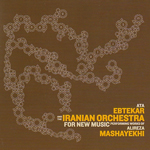|
|
 |
Dusted Reviews
Artist: Ata Ebtekar Album: Ornamentalism: Ata Ebtekar and the Iranian Orchestra for New Music performing works of Alireza Mashayekhi Label: Sub Rosa Review date: Jun. 12, 2009 |

|
|
|
 |
Iranian composer, Alireza Mashayekhi (b. 1940) is on a quest for “meta x.” That is, an artistic exploration based on the belief that “we can discover truth through multilogical structures of artistic thought, this being the only way we can encompass the contradictions that ‘truth’ carries in itself.” This all sounds very Herbert Read or Darmstadt circa 1959 when Boulez and Stockhausen ruled the Euro-centric international new music scene. From König, Bartok, Adorno, Sartre, Heidegger, and all the way back to Palestrina, the specter of European “masters” always looms nearby Mashayekhi’s aesthetic philosophy. But the electroacoustic music of Ornamentalism is just as much an homage to the music and aesthetics of these masters as it is a kind of deterritorializing of their centrality, the hierarchical positionings of East and West, and the role of Orientalism in European art music. Ornamentalism begs the question, what exactly, is the ornament—the flourishes of Persian classical music? The additive synthesis of electronic music? The acoustic instruments? Ebtekar’s voice? Musical philosophy?
Ornamentalism, despite the subtitle of the album (which makes it sound like the album is a collection of works by Mashayekhi faithfully reproduced by Ebtekar and the orchestra) is actually set of 13 compositions very freely interpreted, or “metamorphosed,” “decomposed,” and finally, “electrocuted” by Eta Ebtekar (b. 1972), an Iranian-American composer, noise musician, and sound artist. Now based in the Bay Area, Ebtekar also goes by the name Sote. The result of this collaborative effort between Mashayekhi, Ebtekhar, and the Iranian Orchestra for New Music, which includes instruments from Persian Classical and Western symphonic ensembles, is stunning, not simply for its unusual timbral combinations, but for how much sense Ebtekar makes and re-makes from the Mashayekhi’s music. While the distinct sounds of 1960s and 1970s tape music and analog synthesizers remain in tact in many parts, new techniques of digital sound manipulation also morph those sounds and blend them with the Iranian orchestra. In other parts, the sonorities of Persian classical instruments take over. Most importantly, it all just sounds good.
On the album, larger ensemble pieces are interspersed with interlude-like pieces for piano and electronics, called “Little Tales.” Two of the shortest pieces on the album are only slightly over 20-sesconds long. Still, they explode into pure intensity, close to John Zorn’s Naked City (“Aural Blue”), or savor a single sonic gesture like an Anton Webern miniature (“Pattern Logic”). Track 10, “Meta XY” functions as a gravitational centerpiece to Ornamentalism, where Mashayekhi’s and Ebtekhar’s musical histories collide and re-emerge through one another. Washes of dense electronics give way to unison string section melodies that are gradually swarmed again by electronic thunderstorms. In the moment of joyful and violent coming-together of it all, towards the end of the piece, individual sounds are no longer distinguishable from one another.
While Mashayekhi has also produced various writings on composition and musical aesthetics, the rejection of formulaic musical Orientalism comes across most potently in his music. Between Mashayekhi and Ebtekhar, temporal distances overlap and intersect, and their repeated movements between Iran, Europe, and the US resonate in the layers of musical material. But crucially, the music is shaped not simply by broad categories of nation or ethnicity, but by very personal stories of musical experience. The “Persian” elements in the mix are audible sometimes as timbre, harmony or melody. A whole lot of other times, they are not. Systematically asserting Persian-ness ends up mattering far less than the overall sound, which never sacrifices musical style to philosophical dogma, Orientalist or otherwise.
By Miki Kaneda
|







